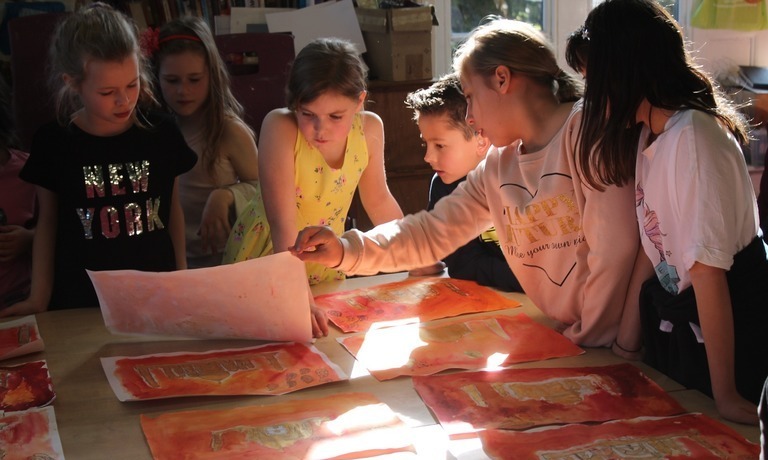THE TRANSFORMATIONAL POWER OF ART
Posted on 27th March 2019 at 11:47
Since its birth as a residential arts centre in 1960, Ingestre Hall has been a hive of creative activity, where children and young people find ways to indentify, interpret, reflect on and share their loves, concerns, hopes, dreams and visions. The art that is produced and shared is often a powerful depiction of young people's thoughts and desires, and allows the viewer to appreciate the effort and reflect on the meaning.
This is a cultural interchange; an exchange of ideas that art has enabled. We all have our own experiences of engaging with art and sometimes. perhaps, we forget those things that have truly inspired us.
As a child of the 80s I was lucky enough to grow up within an environment featuring no shortage of keen activists - all committed to high ideals of peace, social justice and environmental awareness. My mother was one of these activists, spending much of her life in the service of campaigning for a better future for all.
"I can see how some childhood experiences instil a desire for a better world... and allow us to find ways to freely and creatively express ourselves"
Today I received a parcel from a journalist and film maker who knew my mother when she was active in the 80s Greenham Common Women's Peace Camp. It contained recordings of her talking about campaigning for peace, and also from her friend Anne, who had recently been released following incarceration in Holloway for non-payment of fines in relation to Greenham protest activity.
Listening to my mother, a voice that I hadn't heard since 2008, I was struck by the way she describes the contemporary issues of the day and how art and protest were seamlessly woven together, and used as political activism and an expression for positive change.
It instantly evoked memories of a rich landscape of dancing, Chinese dragons, singing, music, art, laughter and lively discussion. As a thirteen year old I didn't realise that this was special; that being part of a dragon's body, singing songs and dancing, and designing campaign materials was something to be cherished, and celebrated as a creative skill, and as a form of cultural belonging.
For me, at the time, it felt like somewhere between mild embarrassment and absurdity. But now, hearing the interviews and recordings (which includes a wonderful instruction for a circle dance and its accordian accompaniament played by my mother), I can see how some childhood experiences instil a desire for a better world, provide the moral and ethical foundation in the struggle for peace and equality, and allows us to find our own ways to freely and creatively express ourselves.

Photograph: Greenham Common Women's Peace Camp (PA)

Photograph: Ingestre participants collaborating in art
Perhaps we have lost our way since reacting to the injustices and threats presented by the politics of the 1980s, not helped by the liberal 90's political establishment. Is it any wonder that we often feel disconnected from each other? Have we lost the capacity for peaceful protest? I worry that as a society, we may have lost an ability to react creatively to political indifference. I hope and trust that as we move through a period now, where fear and lies seem to be motivating factors, and where the arts and creativity are no more than a bourgeoises affecations, that we can take stock of the cultutal climate and take a new position, and express that position creatively, with humour and sensitivity, and where art and dialogue form the cornerstones of action and our desire and vision for change.
Ingestre Hall is well-versed in helping achieve this step toward transformation, offering a place where imagination and possibility are celebrated and used as the buiding blocks for developing confidence and creative expression. A place where dreams are formed and memories forged. It is estimated that over 150,000 children and young people have undertaken an arts residential at Ingestre Hall - and we look forward to harnessing this legacy; creating new and exciting ways to buiild positive change and providing a safer and fairer world for all.
The power of art is in its ability to transform - let us all make sure we are part of that transformation.
With best wishes,
Felix
Felix Pepler is Head of Centre at Ingestre Hall Residential Arts Centre. You can contact him on 01889 270225 / felix_pepler@sandwell.gov.uk
The banner image is a 'chain of peace' from the Greenham Common Women's Peace Camp in 1982. Photograph: Daily Mail/Rex/Shutterstock
Many thanks to Canadian-based journalist, film-maker and musician David Dorrington for providing the recordings.
The Greenham Common Women's Peace Camp story can be found in The Guardian newspaper HERE.
Share this post:

